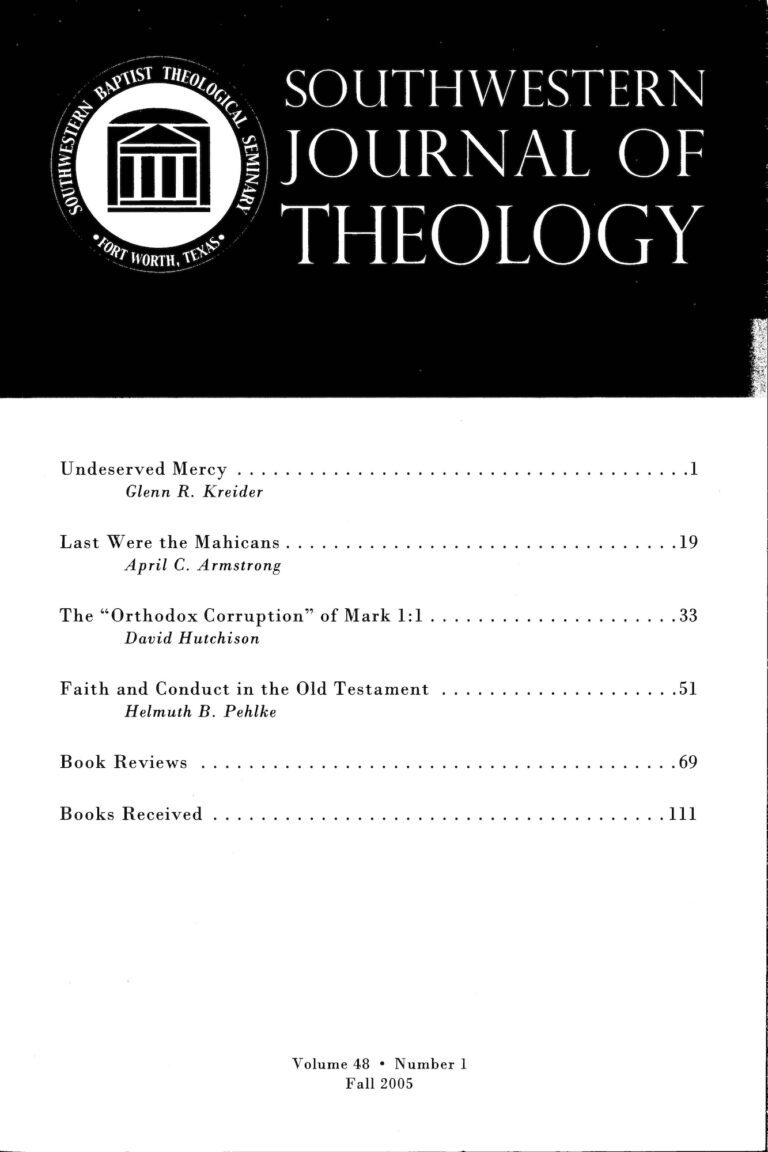
Southwestern Journal of Theology (48.1)
Southwestern Journal of Theology
Volume 48, No. 1 - Fall 2005
Editor: Paige Patterson
By Robert W. Oliver. Carlisle, PA: Banner of Truth, 2006. 410 pages. Hardcover, $26.00.
Robert Oliver, pastor of the Old Baptist Church in Bradford on Avon, Wiltshire, England, recounts the interesting story of English Calvinistic Baptists from the late eighteenth into the nineteenth century. His thorough narrative not only adds to the research on prominent Baptists like John Gill and Andrew Fuller but also introduces individuals typically overlooked in Baptist histories like John Stevens and Benjamin Beddome.
Dividing his work into three sections, Oliver begins his analysis by outlining eighteenth-century developments. Oliver argues that much of the identity of Particular Baptists during the period in question was framed by the confessional stances put forward in the 1689 Confession. When introducing John Gill, Oliver notes the modifications Gill introduces to the confession that led to the excesses of hyper-Calvinism, something a few Particular Baptist congregations would embrace to their own demise.
But hyper-Calvinism was only one of the three challenges that Oliver identifies for his readers. The debate over open or closed communion from 1772-1781 is masterfully explained by Oliver as he seeks to give more of the context (political, social and denominational) that would lead to even greater debate in the nineteenth century. Oliver also recounts the antinomian controversy with great detail. His narrative and thorough footnotes help the modern reader identify the subtle theological distinctions that were at the heart of this theological debate.
In the second section, Oliver highlights the strong disagreements between key leaders of the Particular Baptists. He delves into often overlooked primary sources to flesh out the nature of the debates. He examines how Andrew Fuller’s works arguing for the sufficiency of the Gospel were challenged by other Baptists like Abraham Booth who took on Fuller’s conception of the scope of the atonement, the ordo salutis, and the nature of imputation. By the time the reader reaches the third section of Oliver’s book, the contexts for the nineteenth-century open communion controversy, the Strict Baptist Magazines and the return of evangelical Calvinism in the ministry of Charles Haddon Spurgeon are well understood.
Oliver’s work is built upon his 1986 doctoral dissertation that outlined the development of the English Strict and Particular Baptists from 1770-1850. The footnotes, bibliography and content have all been reworked effectively to demonstrate recent research into the field, but some of the final chapters outside of the chronological scope of the original dissertation do not seem to argue the thesis as well as prior material. In addition, some readers may find the layout confusing at times due to the back and forth interplay between contextual history and biography.
Despite these few weaknesses, Oliver’s much needed book helps to thicken the narrative concerning the nature of Calvinism in English Baptist life. Due to the in-depth mining of obscure primary sources, one of the major strengths of this book is the subtleties and nuances in the theology of Particular Baptists that Oliver is able to bring to light» Pointing to the evangelical nature of most Calvinistic Baptists, Oliver’s appraisal of the antinomian and hyper-Calvinism controversies will provide greater clarity in the further debate over these issues. It should also give most Baptists reason to pause before utilizing these terms in reference to historical figures without considering the full corpus of their writings.
Oliver’s well researched book should be considered mandatory reading for those interested in Baptist history and heritage. As Baptists in the twenty-first century Continue to debate how to relate “Baptist” with “Calvinist,” Oliver’s careful theological and historical analysis should bring further understanding to the deep well of Baptist heritage.





